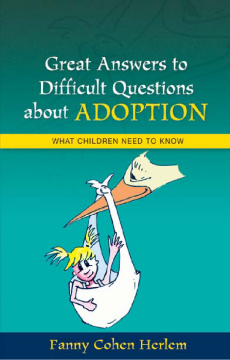
Additional Information
Book Details
Abstract
Why was I abandoned?
Why did my parents adopt me?
What if I want to meet my biological parents?
Children who find out they are adopted have many questions that are difficult for a parent to answer. This book explores children's thoughts and feelings and provides parents with guidance on how to respond to difficult questions.
The author covers all the common questions that children ask and provides sensitive, candid answers in a way that children will be able to understand and relate to. Each chapter is devoted to a particular issue, such as why a child is adopted, who chose the child's first name and what happens when the child grows up. The book recognizes the emotions and reactions of everyone in the family and includes separate conclusions for parents and children.
This handy guide offers useful advice for parents and will also be of interest to counsellors and other professionals working with children.
This is a small, easy to read book...There are helpful chapters on how children might ask about looking different from their adoptive family or manage ambivalent feelings about their country of birth.
Youth in Mind
Chapters are well constructed with an introductory section followed by excerpts from interviews with adopted children of various ages. The checklist for children and notes for parents in the final chapters are succinct and reassuring, as is advice to parents that they should bear in mind that asking fro help is not a sign of parental incompetence.
Rostrum
This little book is written in a very accessible format; dealing with a range of questions that might arise about adoption, these matters are dealt with gently and thoughtfully.
Seen + Heard
Fanny Cohen Herlem is a child psychiatrist and medical director of the adoption service, `Doctors of the World'. She has been helping children and their parents in her practice for the past 25 years.
Table of Contents
| Section Title | Page | Action | Price |
|---|---|---|---|
| Acknowledgments | |||
| 1. Introduction: opportunities and challenges for inclusive value chain development | |||
| Part 1: Context for value chain development | |||
| 2. Value chain development for poverty reduction: A reality check and a warning | |||
| 3. Maize diversity, market access and poverty reduction in the western highlands of Guatemala: Mountain development and research | |||
| 4. Stuck in a rut: Emerging cocoa cooperatives in Peru and factors that influence their performance | |||
| 5. What is cocoa sustainability? Mapping stakeholders’ socio-economic, environmental, and commercial constellations of priorities | |||
| 6. Development impact bonds: Learning from the Ashaninka cocoa and coffee case in Peru | |||
| Part 2: Design and implementation of VCD | |||
| 7. Fit for purpose? Review of tools for gender–equitable value chain development, 2018: Development in practice | |||
| 8. Building frontline market facilitators' capacity: The case of the ‘integrating very poor producers into value chains field guide' | |||
| 9. Value chain development in Nicaragua: Prevailing approaches and tools and persistent gaps | |||
| 10. Value chain development in Vietnam: A look at approaches used and options for improved impact | |||
| 11. Making markets work for women: How push and pull strategies can support women's economic empowerment | |||
| 12. Variation in smallholder strategies and capacities, and implications for effective targeting for value chain development | |||
| 13. Complexity in value chains and implications for businesses and development agencies | |||
| 14. Microfinance plus for ecosystem services: A territorial perspective on Proyecto CAMBio in Nicaragua | |||
| 15. Impact of an agricultural value chain project on smallholder farmers, households, and children in Liberia | |||
| 16. Practical lessons on scaling up smallholder-inclusive and sustainable cassava value chains in Africa | |||
| 17. Gender mainstreaming in value chain development: Experience with gender action learning system in Uganda |
